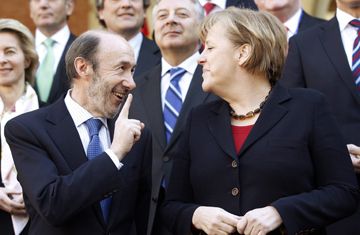
German Chancellor Angela Merkel talks to Spain's Deputy Prime Minister Alfredo Perez Rubalcaba during a family photo at a one-day summit meeting at the Moncloa Palace in Madrid February 3, 2011
Most Europeans watching events unfold in Tunisia, Egypt, and Yemen are doubtless recalling their own exhilarating street revolutions two decades ago, when a wave of popular protests brought down authoritarian regimes in the eastern bloc. According to European lore, the 1989 mass uprisings were based on a shared hunger for secure freedom and democracy. But while the protesters in the streets of Cairo and other Arab cities demand the same rights, European leaders —who more than anyone should appreciate the strength of people power —have done little to support them.
Like the U.S., Europe is treading tentatively, concerned that anything that resembles overt support for the protesters might seem too much like meddling. European Union foreign ministers have appealed for an orderly transition, and free and fair elections in Egypt. A joint statement released on Thursday by Europe's five biggest countries — Britain, France, Germany, Italy and Spain — upgraded the message slightly, echoing U.S. President Barack Obama's urging that the transition process start "now." But officials are wary of backing a movement that could spill out of control.
"There is always an element of worry when there is democratic transition," Finnish Foreign Minister Alex Stubb said on Monday, at the E.U. foreign ministers' meeting in Brussels. British Foreign Secretary William Hague raised the specter of Islamists exploiting the instability in Cairo. "There is a risk of extremist politics taking a greater hold or a more authoritarian system being adopted," he said at the Brussels meeting.
The E.U. leaders' sheepish stance is being criticized by the European Parliament, which has been far more vocal in supporting the protesters. "Western leaders should be more enthusiastic about this craving for freedom and democracy. Let us not repeat the mistakes made when the Iron Curtain came down," said German MEP Martin Schultz in Brussels on Tuesday, referring to Western European leaders' slow reaction to the 1989 revolutions. Edward McMillan-Scott, a British centrist Parliament Vice-President, concurred: "The European Union must get off the fence and support the nascent shoots of freedom before they are snuffed out."
But Europe's track record in the Arab world suggests it prefers to bolster stability rather than rock the boat by demanding change. "The E.U. has been working on agreements with countries whose human-rights records are abysmal," says Rosa Balfour, a senior policy analyst at the European Policy Centre (EPC), who argues that it is not enough to gently chide ARAB leaders behind closed doors. "There is much that can be done to improve the E.U.'s support of democratic change in its neighborhood," she says, pointing out how aid projects could be better tailored to address these issues and how trade preferences could be adapted according to progress.
Indeed, the E.U. does not lack leverage. From 2007 to 2010, Egypt received $760 million (€558 million) in E.U. aid — only $23 million (€17 million) of which went towards human-rights work. And the E.U.'s trade with Egypt in 2009 was $25.6 billion (€18.8 billion), more than three times the $7.3 billion U.S. trade with Egypt that year.
A strategy based on interests rather than values could eventually taint Europe's image, with it developing a reputation as an enabler of autocratic regimes, says Barah Mikail, a senior researcher at Madrid-based think tank FRIDE. "The more comfortable the E.U. has been with allies in the region, the more these allied autocrats have stuck to their ways," he says. "The E.U. has therefore proven unable to create political openings and, simultaneously, lost the hearts and minds of the [Arab] public."
This is all the more glaring given the E.U.'s own claims to being a power that nurtures transformation in the countries in and around it. The E.U. was a force in helping former dictatorships like Spain, Portugal and Greece become modern democracies. After 1989, it was a beacon for the ten former Soviet bloc countries that would eventually join years later. Today, membership continues to be a goal for all the Balkan nations. "The E.U. has practical experience in building systems, and developing plural politics. It can also help with economic ties, as it will be vital to bring investment into [Arab]countries," says Anthony Dworkin, Senior Policy Fellow at the European Council for Foreign Relations (ECFR). "But it's very striking that Europe's reaction [to the Arab protests] has none of excitement and sense of history in 1989."
With Egypt and other Arab nations seemingly in flux, Dworkin says Europe needs to snap out of its dithering daze and seize the chance to stand up for something. "At this moment, when the whole of the Arab world is watching, the E.U. should show it has faith in the values it has supposedly stood for since its foundation, including democracy and human rights," he says.
